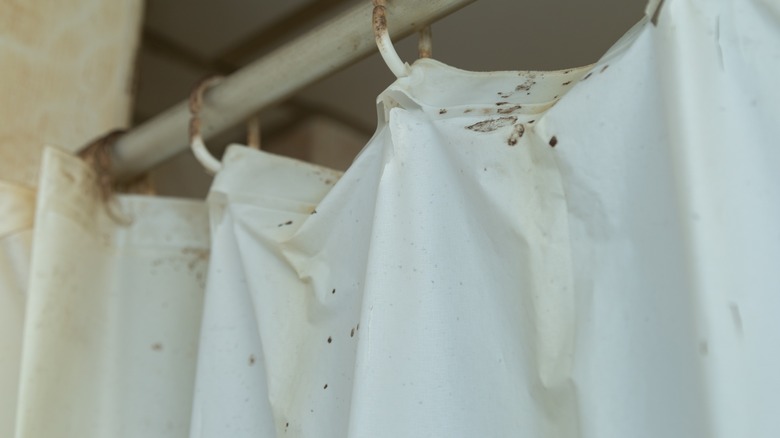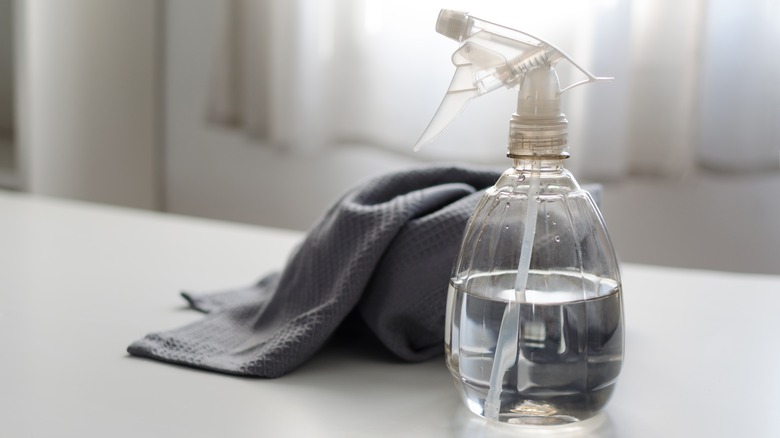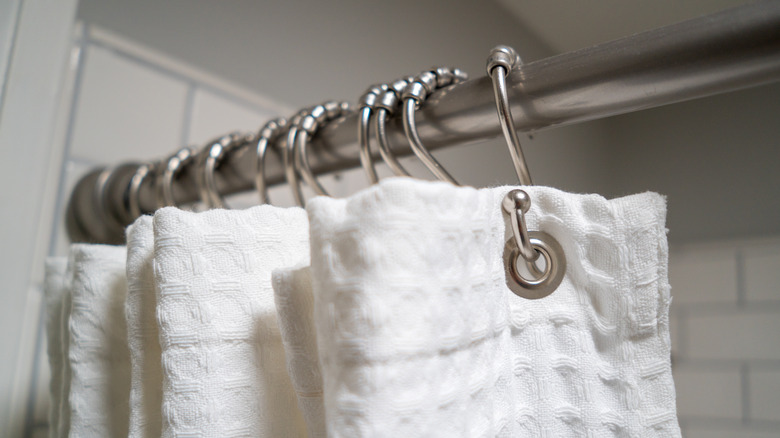Will Pre-Treating A Shower Curtain With Vinegar Prevent Bathroom Mold?
Bathrooms are naturally humid, warm, and often not well-ventilated — in other words, the perfect setup for mold. Mold can hide in your bathroom in all types of places, from moldy bath bottles to toothbrush holders, and of course, shower curtains. While some people advocate pre-treating a shower curtain with vinegar to help prevent mold, other methods are more effective, including reducing moisture and regularly machine-washing the curtain.
Moldy shower curtains are a common issue. "Mold grows where there is moisture," Michael Rubino, mold and air quality expert, environmental wellness advocate, founder of HomeCleanse, president of Change the Air Foundation, and host of the "Never Been Sicker" podcast, exclusively tells House Digest. "Shower curtains are frequently introduced to water from showers and baths, making them prime real estate for microbial growth." Humidity, as well as the porous structure of the shower curtain, can also contribute to flourishing mold.
Over time, inhaling mold can cause symptoms such as headaches, coughing, runny nose, mood swings, chronic fatigue, and more, Rubino says. Washing your shower curtain is one way to prevent mold buildup. But before you pre-treat with white vinegar, here's what you should know.
The pros and cons of vinegar for mold
White vinegar is a common home remedy for mold and mildew. It's cheap and widely available, which makes it a popular option. If you choose to go this route, Michael Rubino says to add about 1 to 2 cups of vinegar to the washing machine during the rinse cycle for your shower curtain. But how effective is white vinegar against mold? "Studies show that acetic acid (the main component of vinegar) exhibits antifungal properties because of its pH and acidic nature," Rubino exclusively tells House Digest. However, white vinegar has some limitations as far as mold prevention. Acetic acid concentrations vary, which affects the strength of the vinegar. Vinegar also doesn't work against all types of mold, Rubino adds.
Instead, he recommends "regular cleaning and actively working to prevent mold by reducing moisture." Ideally, indoor humidity should be between 35-50%. You can lower your bathroom's humidity running the exhaust fan while you shower and opening a door or window if possible.
Rubino advises using a machine-washable shower curtain that you can launder once a month, and adding a botanical laundry additive with surfactants, such as the mold solution concentrate EC3. "This will help eliminate particles on the surface as well as soap scum, mineral buildup, skin cells, and other organic matter floating about," Rubino says. Make sure the curtain is fully dry within 24 hours.
Other ways to prevent shower curtain mold
Aside from washing the curtain and reducing humidity, you can prevent mold on your shower curtain by adopting a few other simple habits. First, after you're done showering, you should separate your shower curtain from the liner and squeegee the shower, Michael Rubino exclusively told House Digest. This helps the shower dry out more quickly.
Additionally, don't forget to also clean the curtain liner, the shower rod, the curtain rings, as well as other porous materials such as bath mats and towels. You can also use an additive like EC3 in those loads to help prevent mold. Deep clean your entire shower and bathroom regularly — Rubino recommends weekly cleaning for the shower.
Lastly, consider the overall condition of your shower. Rubino says mismatched tiles, aging grout, or other structural issues can "trap moisture and particles, allowing microbial growth." Regularly checking for and fixing these issues is a crucial part of mold prevention.


